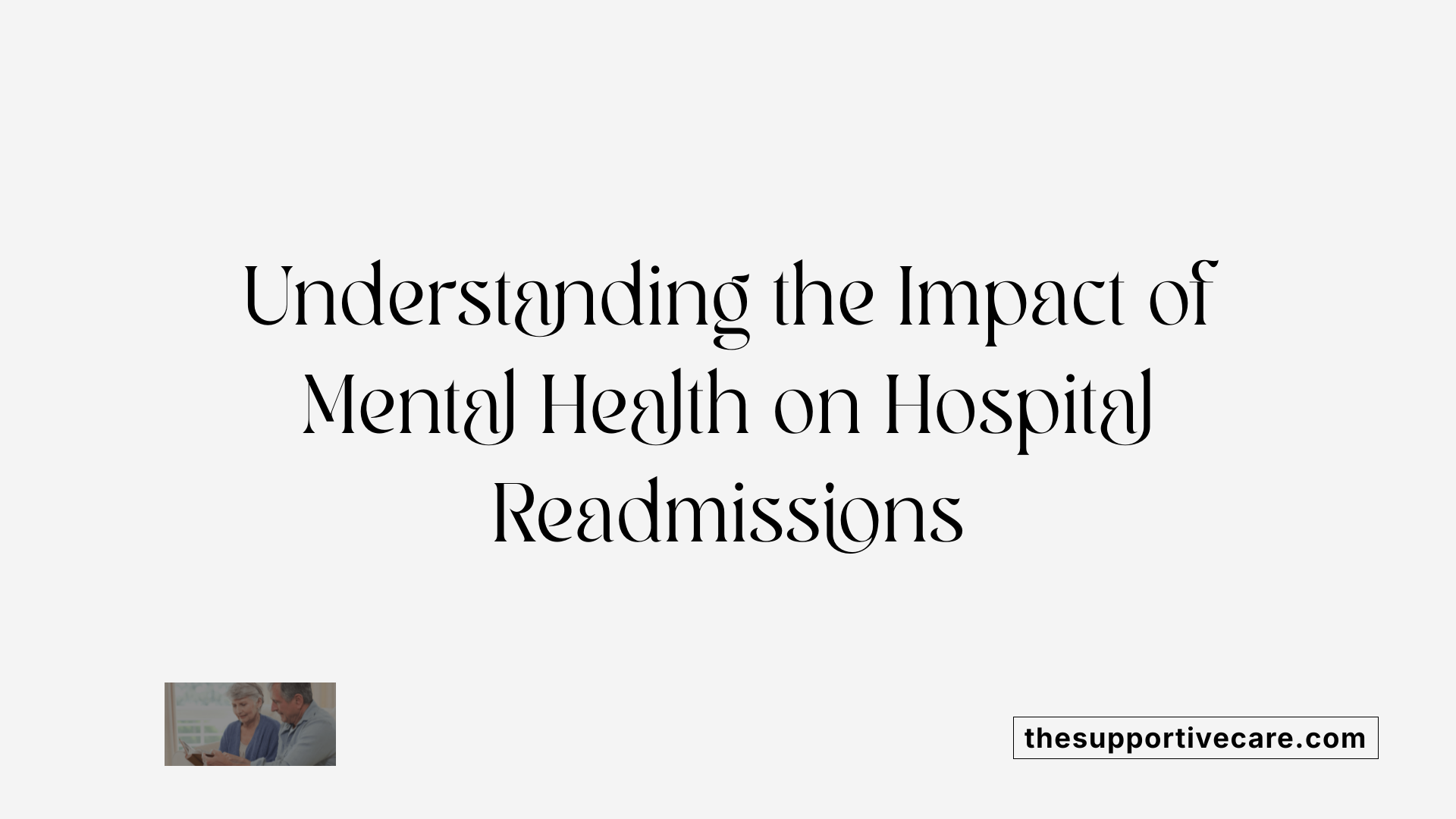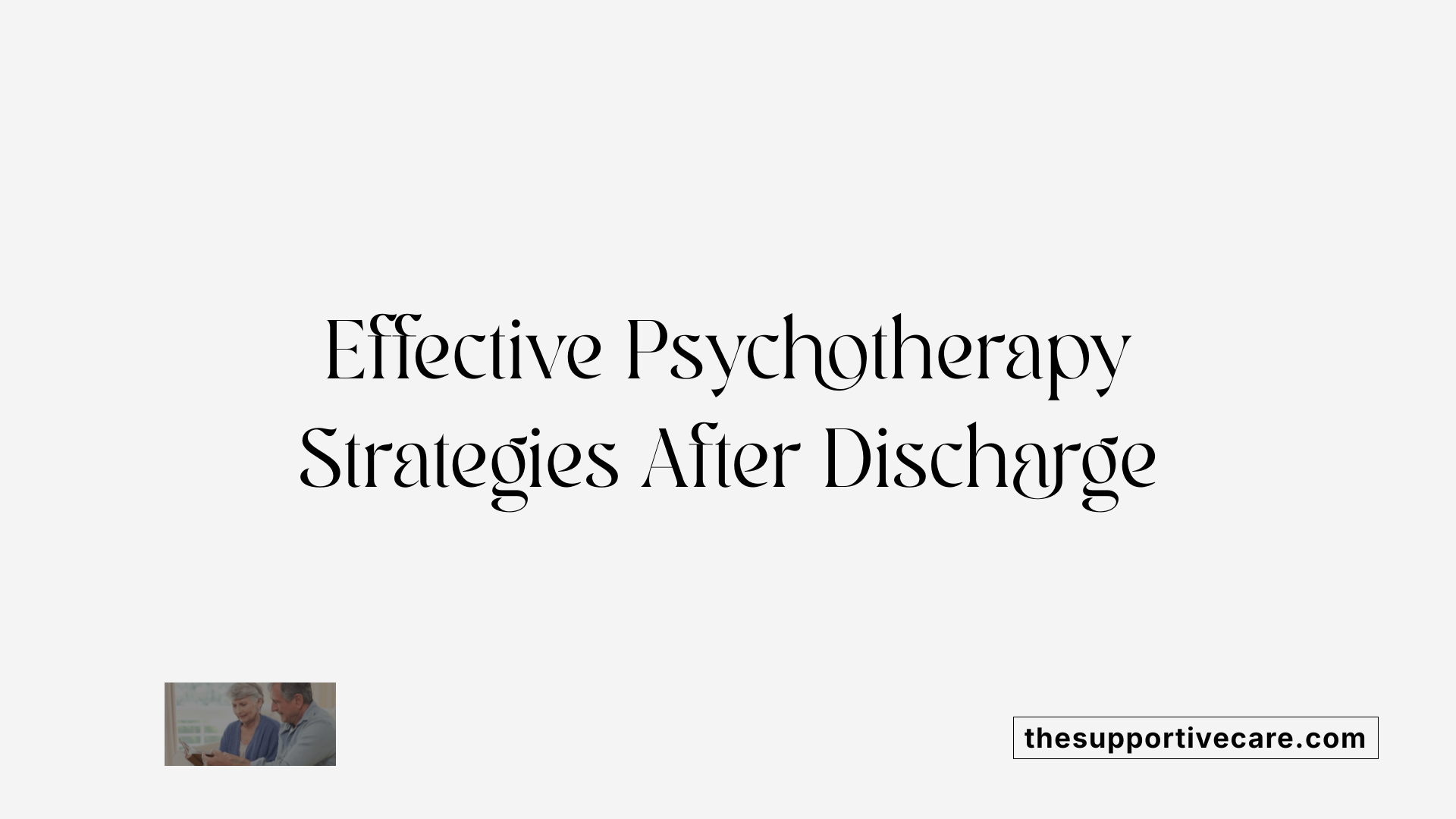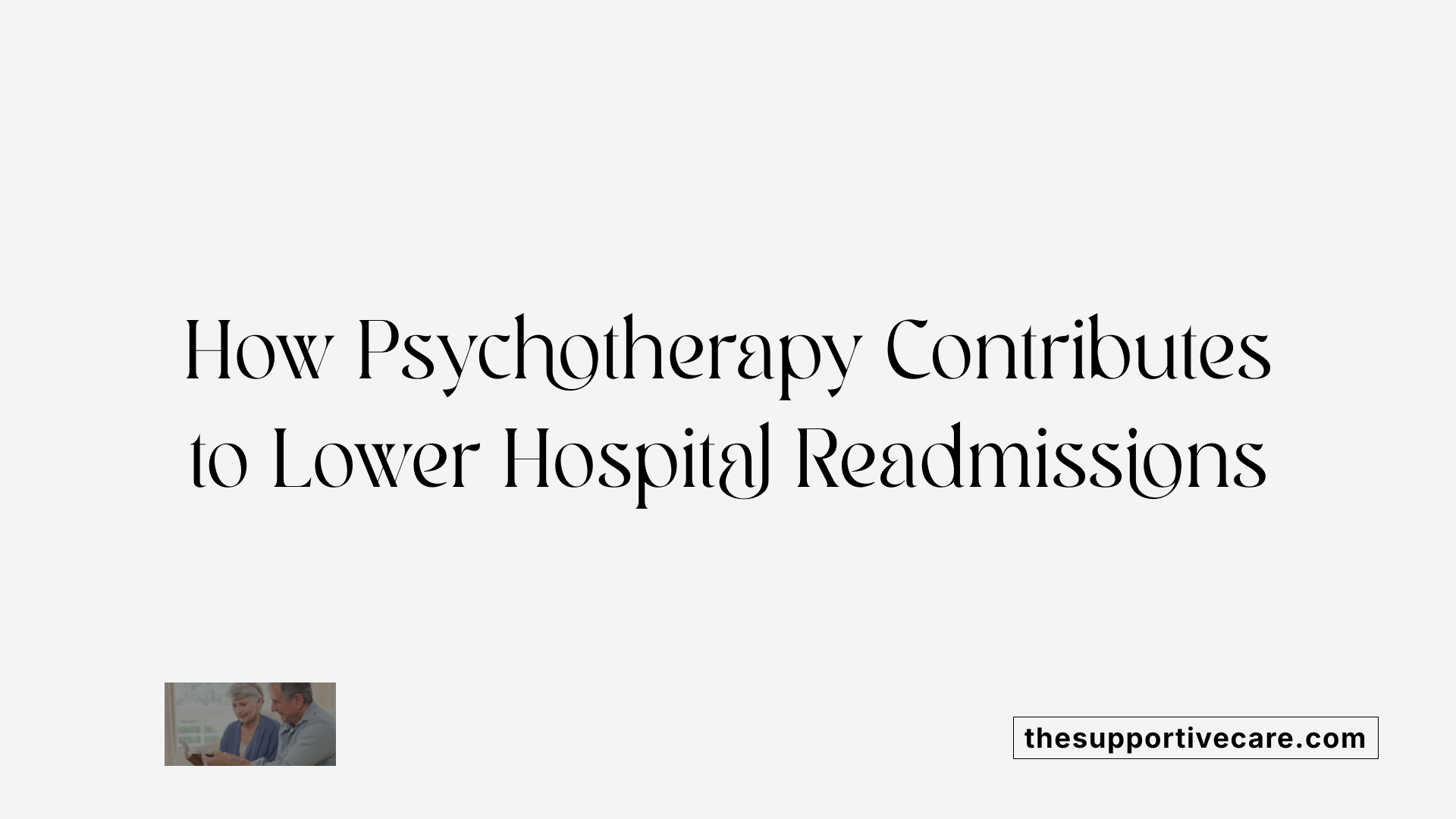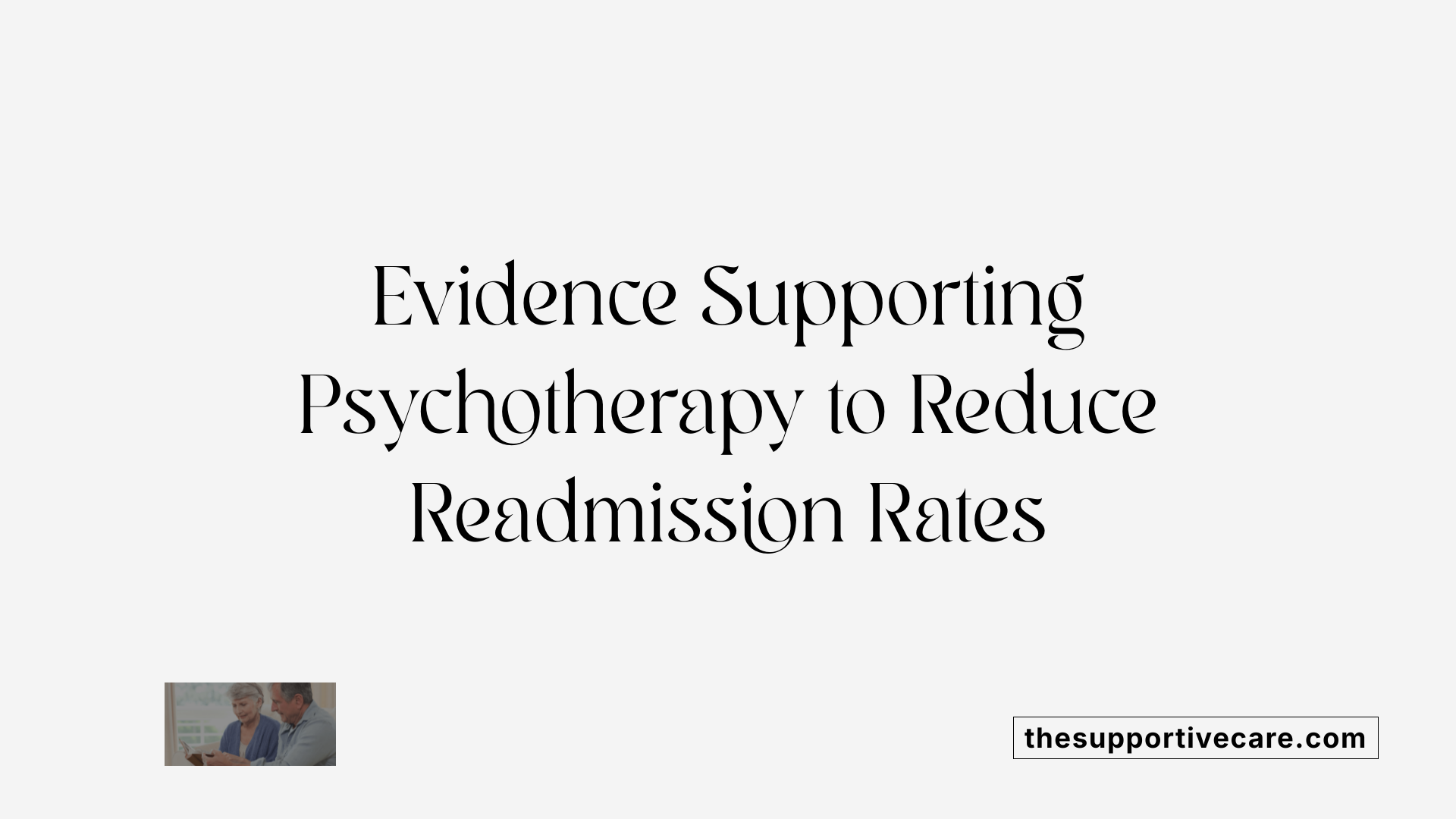The Impact of Psychotherapy on Healthcare Utilization
Hospital readmissions pose a significant challenge to healthcare systems worldwide, impacting patient well-being and increasing costs. Recent research underscores the pivotal role of psychotherapy and mental health interventions in reducing these readmission rates. By effectively managing mental health conditions such as depression and anxiety, which often coexist with physical illnesses, psychotherapy can serve as a vital component of transitional care strategies, ultimately leading to better health outcomes and reduced healthcare utilization.
The Link Between Mental Health and Hospital Readmissions

How do mental health conditions influence hospital readmission rates?
Patients with mental health conditions often face a higher risk of being readmitted to the hospital after their initial stay. This increased likelihood is seen both directly, through the impact of psychological symptoms on physical health, and indirectly, via factors like medication adherence and lifestyle management. When mental health issues such as depression or anxiety are present alongside physical illnesses, they can complicate recovery, increase stress levels, and impair self-care abilities, all of which contribute to higher readmission rates.
Research indicates that patients hospitalized with physical health conditions and comorbid mental illnesses are 28% more likely to be readmitted within thirty days than those without mental health issues. Furthermore, for specific conditions included in the Hospital Readmissions Reduction Program (HRRP), patients with mental health challenges are 56% more likely to be readmitted. These statistics highlight the significant influence of mental health on the overall healthcare utilization associated with physical illnesses.
The role of comorbid mental health disorders in healthcare utilization
Community mental health infrastructure plays an important role in reducing these readmission rates. Regions with stronger mental health services see notably lower hospital readmission rates, emphasizing the importance of accessible mental health care. Additionally, community-based interventions and integrated care models that combine physical and mental health treatments have proven effective in improving patient outcomes.
Interventions like psychotherapy, emotional support, and cognitive therapy delivered after hospital discharge can lower the risk of recurrent hospitalizations. For instance, studies have found that mental health-focused aftercare programs, including telemonitoring and targeted counseling, have successfully decreased readmissions by addressing both psychological and physical health needs.
Physical and occupational therapy also intersect with mental health care, as improving physical function, balance, and independence can alleviate depressive symptoms and reduce relapse risk. Such interdisciplinary efforts demonstrate that comprehensive mental health treatment is crucial for reducing avoidable hospital readmissions.
| Aspect | Impact | Additional Details |
|---|---|---|
| Increased readmission risk | Patients with mental health conditions are more likely to be readmitted | 28% higher within thirty days; 56% more for HRRP conditions |
| Community infrastructure | Strong mental health services reduce readmission rates | Availability of mental health resources correlates with better outcomes |
| Effective interventions | Psychotherapy, telemonitoring, integrated care | Reduce readmissions, improve quality of life |
| Physical health and mental health | Addressing both improves long-term prognosis | Functional improvements and mental wellness support each other |
Understanding and addressing the mental health needs of hospitalized patients is essential not only for their psychological well-being but also for reducing the frequency of avoidable hospital readmissions. Investing in comprehensive mental health services and integrating these with physical health care can lead to healthier, more sustainable patient outcomes.
Psychotherapy Strategies Post-Hospitalization
 What strategies involving psychotherapy are effective in reducing hospital readmission rates?
What strategies involving psychotherapy are effective in reducing hospital readmission rates?
Research indicates that targeted psychotherapy interventions can significantly lower the chances of patients returning to the hospital. One effective approach is the early implementation of integrated mental health services during hospitalization, such as cognitive-behavioral therapy (CBT) and emotional support sessions, which help address symptoms of depression and anxiety that often contribute to readmissions.
Post-discharge, ongoing support through psychotherapy, including individual and group therapy, reinforces mental well-being and promotes adherence to treatment plans. These interventions can be delivered via telemonitoring, telephone-based CBT, or in-person sessions, making support accessible and flexible.
Care transition programs like the Care Transitions Intervention (CTI) that combine psychological support with practical guidance have demonstrated success in reducing readmission rates. Incorporating mental health protocols, such as nurse-driven depression management and telehealth follow-ups, ensures continuous psychological care and early detection of relapse symptoms.
Community mental health infrastructure plays a vital role in sustained recovery. Well-established community programs and easy access to mental health services address social and psychological barriers that increase readmission risks.
Furthermore, clear and empathetic communication at discharge—using teach-back techniques to ensure patient understanding—facilitates better adherence to medications and lifestyle changes. Regular follow-up appointments, whether via phone or video, help identify early signs of mental health decline, enabling timely intervention.
In conclusion, a combination of psychotherapy, structured care transition planning, community resources, and effective communication strategies forms the most successful approach to reducing hospital readmission rates linked to mental health challenges. This multidisciplinary effort ensures that psychological needs are met, supporting overall recovery and avoiding preventable hospital revisits.
The Efficacy of Psychotherapy in Lowering Readmission Rates

How does psychotherapy impact hospital readmission rates?
Evidence indicates that psychotherapy and mental health interventions can help reduce hospital readmission rates by addressing underlying mental health conditions and improving patient coping strategies. Specific interventions, such as individual and group psychotherapy, depression care management, and combined care transition programs, have shown potential to lower readmissions in certain patient groups, particularly those with comorbid mental health diagnoses.
Psychological therapies like emotional support and cognitive behavioral therapy (CBT) have demonstrated benefits in managing mental health symptoms such as depression and anxiety, which are linked to increased physical health complications. For example, mental health interventions post-discharge, including telemonitoring, psychotherapy, and supportive texts, have been associated with a decrease in physical health readmissions.
Research shows that programs using peer support and caregiver training, especially ones based on CBT principles, can further improve engagement and mental health outcomes. These improvements can translate into fewer hospital returns, especially for patients with conditions such as heart failure, COPD, or after cardiac surgeries.
However, the overall effectiveness of psychotherapy alone remains mixed. Some studies indicate significant benefits, while others show only modest effects. This variability underlines the importance of integrating mental health treatments within a comprehensive care plan, rather than relying solely on psychotherapy.
In summary, while psychotherapy shows promise in reducing readmission rates, especially when combined with other health management strategies, additional research is necessary to confirm its impact across diverse conditions and patient populations. The integration of mental health support into care transitions remains a promising approach to improving patient outcomes and lowering healthcare costs.
Research Supporting the Role of Psychotherapy in Reducing Readmissions

What research supports the effectiveness of psychotherapy in reducing hospital readmissions?
Evidence from recent studies suggests that psychotherapy can play a significant role in reducing hospital readmissions, especially for patients with mental health comorbidities. Integrating psychological therapies such as emotional support and cognitive-behavioral therapy (CBT) into post-discharge care plans has shown promising outcomes.
Research indicates that patient engagement during therapy sessions, along with timely follow-up, enhances adherence to treatment and improves health outcomes. For instance, remote intensive outpatient programs focusing on mental health have demonstrated a notable decline in emergency department visits related to psychiatric conditions, with many clients not returning to the ED within three months of discharge.
Furthermore, implementing physician follow-up within 30 days after hospital discharge is associated with reduced psychiatric readmission rates. High-risk patients, such as those with depression and anxiety, are particularly benefitted by support from mental health professionals.
While not all intervention studies show consistent effects, the overall pattern supports the role of psychotherapy and supportive mental health services in lowering hospital readmissions. The strategy appears especially effective when combined with comprehensive discharge planning and continuous support.
Nonetheless, further research is needed to clarify which specific therapeutic approaches yield the most benefit across different patient populations and conditions, ultimately aiding in the optimization of mental health interventions to prevent avoidable hospitalizations.
Physical and Social Support Interventions Complementing Psychotherapy
 Combining physical and mental health strategies offers a comprehensive approach to reducing hospital readmissions. When mental health therapies, such as emotional support or cognitive behavioral therapy, are integrated with physical health care, the results can be very positive. For example, programs that combine these elements have been effective in improving mental health symptoms, boosting quality of life, and enhancing overall functioning. These benefits can decrease the chances of preventable hospital visits.
Combining physical and mental health strategies offers a comprehensive approach to reducing hospital readmissions. When mental health therapies, such as emotional support or cognitive behavioral therapy, are integrated with physical health care, the results can be very positive. For example, programs that combine these elements have been effective in improving mental health symptoms, boosting quality of life, and enhancing overall functioning. These benefits can decrease the chances of preventable hospital visits.
Physical therapy plays an important role by helping patients recover mobility, build strength, and prevent falls—common causes of readmission. For patients with chronic health issues like heart failure or COPD, physical activity and rehabilitation can foster independence and reduce complications. Occupational therapists contribute by evaluating and addressing activities of daily living (ADLs), ensuring safe home environments, and promoting social participation, all of which support safer discharges.
Community support systems, especially those involving volunteers trained as therapists, have also proven effective. These programs assist with medication adherence, finding housing, employment, and providing emotional support. For example, volunteer- led initiatives have shown to significantly reduce 30-day readmission rates, particularly among vulnerable populations such as those with schizophrenia.
Community-based mental health infrastructure can lower hospital readmission rates by providing ongoing support outside the hospital setting, addressing social determinants of health, and maintaining continuity of care. Overall, these integrated physical, mental, and social interventions help stabilize health, manage functional deficits, and foster resilience, leading to fewer visits to the hospital.
| Strategy/Intervention | Role | Impact on Readmission | Additional Details |
|---|---|---|---|
| Mental health therapy (CBT, emotional support) | Addresses psychological symptoms | Reduces anxiety, depression, stabilizes mental health | Improves medication adherence and lifestyle |
| Physical therapy | Improves mobility, strength, gait | Prevents falls, maintains independence | Focuses on early mobilization and rehab |
| Occupational therapy | Assesses daily activities and safety | Enhances independence, reduces hazards | Home safety assessments, caregiver training |
| Community volunteer programs | Support in medication, housing, social needs | Decreases social isolation, promotes adherence | Examples include peer support groups |
| Community mental health infrastructure | Provides ongoing mental health services | Lowers community and hospital readmissions | Focus on social determinants of health |
These strategies highlight the importance of addressing both physical and mental health, along with social factors, in efforts to prevent avoidable hospital readmissions.
Moving Towards a Patient-Centered, Multidisciplinary Approach
The evidence strongly supports the integration of psychotherapy and mental health interventions into hospital care and transition processes as a means to reduce preventable readmissions. Strategies like cognitive behavioral therapy, community mental health infrastructure, and combined physical and mental health programs demonstrate significant potential to improve outcomes. Physical therapies and home-based interventions further enhance recovery by addressing functional deficits and social needs. Moving forward, healthcare systems should adopt comprehensive, multidisciplinary models that include mental health support, physical rehabilitation, and social engagement to ensure optimal patient recovery, reduce hospital revisit rates, and improve overall health equity.
References
- Effective mental health interventions to reduce hospital readmission ...
- Role of Physical Therapists in Reducing Hospital Readmissions
- Using Volunteer Therapists to Reduce Hospital Readmissions
- Effective mental health interventions to reduce hospital readmission ...
- How Physical Therapy Reduces Hospital Readmissions
- Design and rationale for a randomized controlled trial to reduce ...
- [PDF] Guide for Reducing Disparities in Readmissions - CMS



































































































